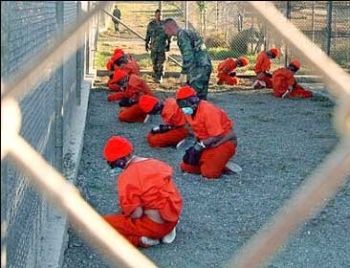
Publisher:
Bonnie King
CONTACT:
Newsroom@Salem-news.com
Advertising:
Adsales@Salem-news.com

~Truth~
~Justice~
~Peace~
TJP
Jun-05-2007 00:33

 TweetFollow @OregonNews
TweetFollow @OregonNews
Judge Dismisses Charges Against Second Guantanamo Detainee
Salem-News.comThe issue in both cases was the status of the detainees as determined by their Combatant Status Review Tribunals.
 Detainees photographed at Guantanamo Bay or "Gitmo" as it is called by people stationed there |
(NAVAL STATION GUANTANAMO BAY, Cuba) - Following suit from events earlier in the day, a military judge tonight dismissed the terrorism charges against Yemeni detainee Salim Ahmed Hamdan.
Navy Capt. Keith J. Allred, the judge in Hamdan's military commission case here, granted a defense motion to dismiss the charges based on a lack of jurisdiction. Allred's ruling follows a decision earlier today by Army Col. Peter Brownback, who dismissed the charges against Canadian Omar Khadr for similar reasons.
The issue in both cases was the status of the detainees as determined by their Combatant Status Review Tribunals. Both detainees were classified as "enemy combatants," one of only two designations offered by the administrative hearings, but the Military Commissions Act of 2006 requires that a detainee be classified as an "unlawful enemy combatant" to be tried by military commission.
In announcing his decision, Allred said that the CSRT determination, in 2004, was made to determine the proper detention of detainees, not their qualification for military commissions. Also, the CSRT finding used a much less stringent definition for "enemy combatant" than the Military Commissions Act uses for "unlawful enemy combatant," he said.
Allred also noted that the CSRT was conducted two years before the Military Commissions Act was signed into law, and Hamdan may well have acted differently if he knew the hearing would determine whether he would be tried by military commission.
Hamdan was charged with conspiracy and providing material support for terrorism. The specific allegations included that he was a bodyguard and personal driver for Osama bin Laden and transported weapons, ammunition and supplies for al Qaeda.
Joseph McMillan, one of Hamdan's civilian attorneys, argued that U.S. law establishes that jurisdiction of military courts is very limited and must be specifically defined. The charge sheet against Hamdan fails to state the facts on which jurisdiction depends, and instead is very vague, McMillan said. He urged Allred not to ignore the word "unlawful," as it was inserted into the law purposefully to ensure lawful enemy combatants are not subject to the law of war.
"Congress inserted the word 'unlawful' deliberately, repeatedly and with good reason," McMillan said, referring to the Military Commissions Act.
In arguing against the dismissal, the prosecution said that because Hamdan is alleged to have been a member of al Qaeda, that qualifies him as an unlawful enemy combatant, based on a presidential pronouncement in 2002 that qualifies all members of that and affiliated groups as unlawful enemy combatants. Allred dismissed that argument, saying the president's pronouncement applies to the group at large, and not individual cases.
Allred allowed that the prosecution may have evidence that proves Hamdan is an unlawful enemy combatant, but making that determination will require either reopening the 2004 CSRT or establishing a new one. The prosecution asked for 72 hours to consider appealing Allred's decision, and their request was granted.
Hamdan's case was the one that caused the previous military commissions system to be shut down, after he challenged his detention and his case went to the U.S. Supreme Court. His arraignment today was under the Military Commissions Act of 2006, which Congress and the president crafted in response to the Supreme Court's ruling.
After the ruling, McMillan and Navy Lt. Cmdr. Charles Swift, Hamdan's detailed defense counsel, called today a good day for the military justice system. "What this demonstrates once again is if you put together a statute in three weeks' time, try and rush it through, and then make a series of decisions that are conclusory, you end up with a process that doesn't work," Swift said. "Hopefully, what you also saw was that military justice and military judges are capable of doing good work."
McMillan said that Allred's ruling conforms to the precedence for military tribunals, and was based on a good reading of the Military Commissions Act. The onus is now on the prosecution to decide whether to appeal and to hold an administrative hearing that correctly classifies Hamdan, he said.
Swift said that Hamdan is relieved that he will have a better chance at a fair hearing, and is patiently waiting for that opportunity. Although Hamdan does not have much formal education, Swift said, he believes in fairness. "That's all he's ever asked for," Swift said.
In response to the ruling in this case and the Khadr case, Army Maj. Beth Kubala, spokeswoman for the Office of Military Commissions, dispelled any conjectures about the future of military commissions.
"Based on today's rulings in the Hamdan and the Khadr arraignments, the public should make no assumptions about the future of (Office of Military Commissions) status or processes," Kubala said. "OMC will continue to operate in a manner that's fair, transparent, open and legitimate. If nothing else, today's rulings highlight that the judges operate independently."
**********************************************************
Special thanks to Sgt. Sara Wood, USA American Forces Press Service
Articles for June 4, 2007 | Articles for June 5, 2007 | Articles for June 6, 2007

Quick Links
DINING
Willamette UniversityGoudy Commons Cafe
Dine on the Queen
Willamette Queen Sternwheeler
MUST SEE SALEM
Oregon Capitol ToursCapitol History Gateway
Willamette River Ride
Willamette Queen Sternwheeler
Historic Home Tours:
Deepwood Museum
The Bush House
Gaiety Hollow Garden
AUCTIONS - APPRAISALS
Auction Masters & AppraisalsCONSTRUCTION SERVICES
Roofing and ContractingSheridan, Ore.
ONLINE SHOPPING
Special Occasion DressesAdvertise with Salem-News
Contact:AdSales@Salem-News.com

Salem-News.com:
googlec507860f6901db00.html

Terms of Service | Privacy Policy
All comments and messages are approved by people and self promotional links or unacceptable comments are denied.
[Return to Top]
©2025 Salem-News.com. All opinions expressed in this article are those of the author and do not necessarily reflect those of Salem-News.com.